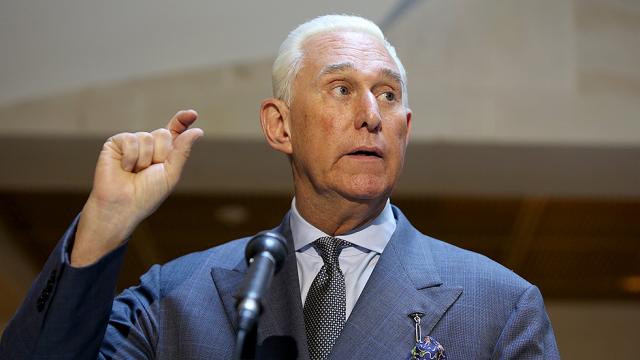
Longtime Trump adviser Roger Stone is in an increasing amount of trouble in the Russia investigation, it would seem.
What is less clear is how much his trouble might ensnare President Trump.
The Washington Post reported recently on previously unknown alleged contacts between Stone and WikiLeaks founder Julian Assange. A person close to the situation, who spoke on the condition of anonymity, told The Post Stone spoke in spring 2016 about communications in which Assange talked about having hacked Democratic emails. The Post also reported that none other than Stone protege Sam Nunbergconfirmed Stone told him he had met with Assange — something Stone contends was a joke Nunberg misunderstood.
Stone has argued the tweet was referring to legal troubles ahead for Podesta stemming from the release of the Panama Papers. He has also admitted he had been in contact with Guccifer 2.0 — the allegedly Russian-affiliated hacker behind the DNC emails — and that he communicated with Assange through an intermediary (allegedly a journalist) whom he has declined to name.
We now have at least two concrete examples, though, of Stone saying he had been in contact with Assange — both around the same time, and both shortly before the seemingly prescient Podesta tweet. For someone who says he did not meet with Assange, Stone sure spent a conspicuous amount of time saying he had met with Assange.
So let’s say for argument’s sake Stone was working with Assange. If that is the case, how much might it implicate the Trump campaign or Trump himself? That is not clear, given that Stone was an informal outside adviser rather than a campaign aide. It is also unclear whether working with WikiLeaks would amount to collusion, given that its alliance with the Russians is somewhat murky (the intelligence community essentially regards it as a front for the Kremlin).
As recently as last week, Stone argued working with WikiLeaks would not be treasonous because it is not, in fact, aligned with Russia.
“No, actually, I don’t think so because for it to be a treasonous act, Assange would have to be probably a Russian asset and WikiLeaks would have to be a Russian front, and I do not believe that is the case,” Stone told Chuck Todd.
During that appearance, Stone offered several apparently carefully worded denials, including saying he did not know about “the content, the source or the exact timing of the WikiLeaks disclosures” — comments that notably still allowed for him to have known about the existence of the emails. He also said clearly, though, he had never spoken with Trump about WikiLeaks disclosures at any point, which if true would seem to insulate the president.
Trump’s knowledge aside, former federal prosecutor Patrick Cotter said the development could be a “very important piece” of the puzzle — albeit only a piece.
“Did he knowingly enter into an agreement with WikiLeaks and Russia to help the Trump campaign?” Cramer said. “If he did, then he might be culpable, as would anyone else who helped facilitate the relationship and/or promise anything in return.
“If Assange clued in Stone as to the source of the hacks, then investigators are on their way to building a case.”
